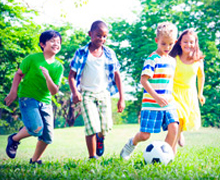
The school year is winding down for the summer, but if you are a parent, it’s not too early to start thinking about how you can help your child excel in the classroom in the fall. One way is to help them get in better shape because researchers at Nottingham Trent University in England found the fittest adolescents showed better attention, perception and memory, as well as higher-level decision making and complex thinking than their less-fit classmates.
Sports scientists at Nottingham Trent wanted to find out how a one-hour physical education (PE) class, soccer in particular, affected the performance of children in the classroom and published their findings in the journal Frontiers in Psychology.
A group of 76 students ages 12 and 13 took part in the study which included a series of cognitive tests before and after the PE class. Working memory, as measured by the retention of small amounts of information, was observed to be improved by about 10 percent in the pupils who spent more time performing moderate to vigorous activity during the class.
At another time away from the PE lesson, researchers measured the fitness levels of the students through a running test. That’s when it was concluded those with the highest levels of fitness performed better in a series of cognitive tests.
Attention, perception, memory and executive function tasks were between 10 and 20 percent better and accuracy was achieved with faster response times in the fit students when compared to those less fit. The tests measured concentration, the retention and detection of information, higher-level decision making and complex thinking, things researchers agree are important for classroom performance.
"We found that fitter children performed particularly well across a range of measures considered important for academic achievement and performance in school," said lead researcher Luke Gilbert. "Our study demonstrates the importance of fitness in young people. Furthermore, as PE is the only opportunity for many young people to undertake moderate-to-vigorous physical activity and develop their fitness, it further highlights the value and importance of PE."
Fellow researcher Dr. Simon Cooper added, "This was the first study to look specifically at how a PE lesson might affect cognition, which is important considering that cognition affects the ability to learn and perform at school," he said. "The time allocated for PE in schools is sometimes reduced in favor of more academic subjects and this could be counterproductive for enhancing the achievement of pupils.
"While evidence shows physical activity positively affects cognitive function in young people, we know that the intensity, duration and type of activity are very important. For future work we'd like to understand more about how different types of PE might affect cognition, along with how PE could be optimized in terms of the potential cognitive benefits."
Click here to read more in the journal Frontiers in Psychology.
